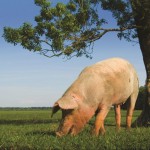Progress made in BPHS to CCIR transition
The 12 offal conditions to be monitored at the abattoir under the new Collection and Communication of Inspection Results (CCIR) programme have been agreed, AHDB Pork has confirmed.
The Food Standards Agency (FSA) and AHDB Pork have collaborated to review the list of conditions to be recorded by meat inspectors in abattoirs. The project is designed to improve information exchange between livestock producers and processors.
According to AHDB Pork food safety project manager, Emma Bailey-Beech, the agreement puts the project in a strong position to move forward and be rolled out nationally. The target is for the CCIR programme to replace the British Pig Health Scheme (BPHS) from March 2017 following a smooth transition.

FSA programme lead Ramon Romero.
“The Food Standards Agency (FSA) is legally required to provide information to producers, regarding their findings at anti-mortem and post-mortem at the abattoir, currently this is supported by BPHS and is the requirement for CCIR,” Bailey-Beech explained.
“However, AHDB Pork gained evidence during work through the BPHS, and found that CCIR was accurate for the national herd but not necessarily for each batch of pigs presented for slaughter. So we’ve been working closely with industry and continue to work with FSA and their meat inspectors, to improve the accuracy of CCIR before BPHS is phased out.”
FSA programme lead, Ramon Romero added: “The list has been completed by working with stakeholders and other government departments to have more focused post-mortem inspection conditions which farmers can act upon.
“I‘m very confident that we’re building a more robust platform to ensure conditions that relate to public or animal health, or animal welfare, are reported consistently and promptly to ensure the necessary action is taken.”
In agreement with industry partners, an FSA funded trial is due to begin shortly to validate the new lists and the system processes supporting it.

 AHDB Pork to host regional forums for pig industry
AHDB Pork to host regional forums for pig industry Restaurant staff develop meat knowledge on education programme
Restaurant staff develop meat knowledge on education programme
